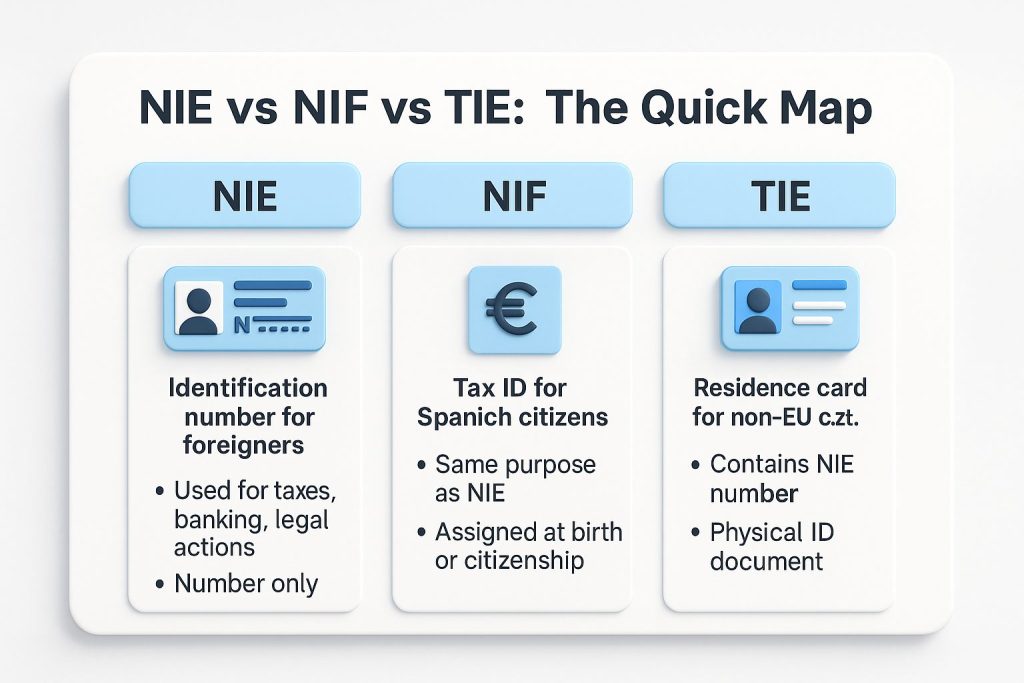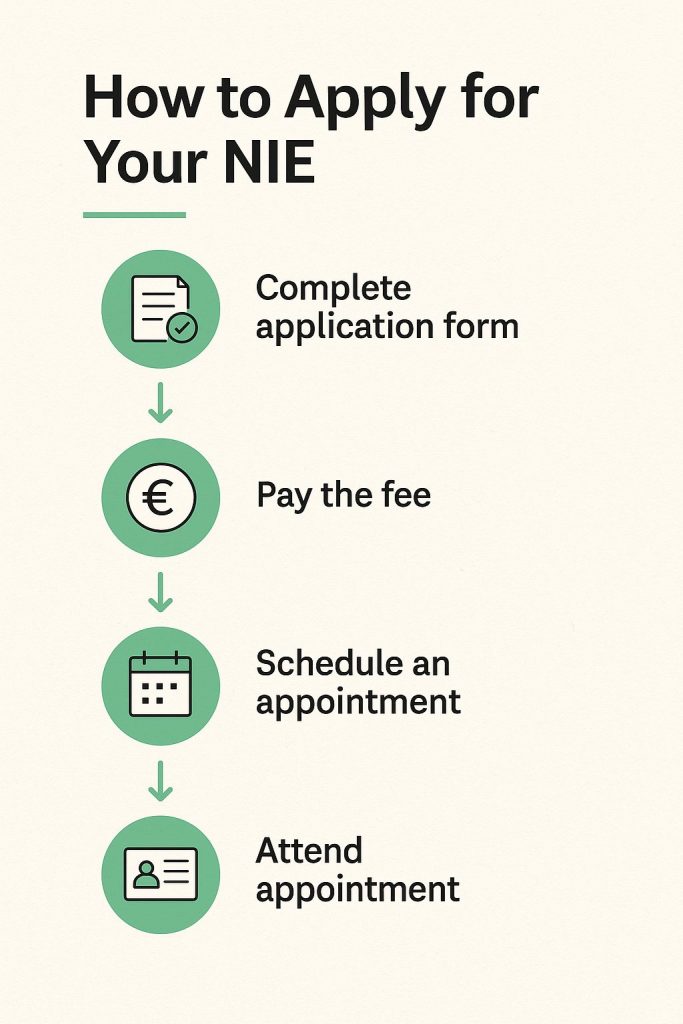Let’s get this out of the way: nobody enjoys dealing with identification numbers, especially not in a new country where every office feels like a different universe. But here we are — talking about the NIE. If you’re wondering what is NIE Spain, trying to decode the NIE meaning, or just figuring out why every bank manager, notary, or real estate agent keeps asking for it, you’re in the right place.
We’ve helped thousands of newcomers get through Spain’s bureaucratic maze, and trust us — the NIE looks scarier than it is. Still, it’s a strange little number. One that quietly decides what you can and cannot do in Spain. And yes, sometimes it behaves like it has a personality of its own.
So let’s break it down, the way we explain it to our clients when they ask us for the tenth time: “Do I really need this thing?”
What Is an NIE (Número de Identidad de Extranjero)?
If we strip it down to essentials, the NIE is nothing more than your foreigner identification number in Spain. Not a card. Not an ID document. Just a number — but one with consequences.
It looks something like X‑1234567‑T, and once you get it, it stays with you forever. People sometimes compare it to a tattoo; we won’t go that far, but the idea isn’t entirely off the mark.
Official reference: The Spanish Ministry of the Interior defines the NIE as the unique identification number assigned to any non-Spanish national interacting with Spanish authorities.
Key points
- It functions as your official Spain foreigner ID.
- It never expires.
- It’s required for taxes, banking, property, employment, residency — practically everything.
- EU citizens, non-EU citizens, residents, and non-residents — everyone receives the same format.
If Spain were to run on a single rule, it would be this: no NIE, no paperwork.
What Is an NIE Used For?
Here’s the moment we see people’s eyes widen. The NIE isn’t just for immigration or taxes. It’s everywhere.
You’ll need an NIE to:
- Open a bank account.
- Buy or sell property (even if you’re staying one week).
- File taxes or receive a tax refund.
- Sign an employment contract.
- Start a company or register as self‑employed.
- Connect electricity, internet, or water in your home.
- Receive inheritance.
- Register a car.
- Sign long‑term rental agreements.
Basically, if a piece of paper might end up in a public office, the NIE will be involved.
Who Needs an NIE in Spain?
The short answer? Anyone who isn’t Spanish and plans to do something even mildly official.
More specifically:
- EU citizens — for taxes, banking, rentals, buying property, and residency paperwork.
- Non‑EU citizens — for visas, permits, TIE cards, and everything that follows.
- Residents — the NIE is printed on your residence card.
- Non‑residents — especially property buyers and investors.
- Students, freelancers, digital nomads — modern life requires modern paperwork.
We often joke with clients: you can fly into Spain without an NIE, but you can’t really live here without one.
NIE vs NIF: What’s the Difference?
Let’s clear up one of the biggest confusions.
- NIE is for foreigners.
- NIF is for Spanish citizens.
Both numbers are used for taxes, contracts, banking — essentially the same purposes, just assigned to different groups.
Comparison table
| Feature | NIE | NIF |
|---|---|---|
| Who receives it | Foreigners | Spanish citizens |
| Format | Letter + digits + letter | Digits + letter |
| Purpose | Taxes, banking, legal actions | Same purposes |
| Lifetime validity | Yes | Yes |
| Interchangeable? | No | No |
Why the separation? Tradition. Bureaucracy. Take your pick.
NIE vs TIE: Key Difference
This mix‑up happens constantly, so let’s make it easy:
- NIE = a number.
- TIE = a physical card (your residence card).
You can have an NIE without residency, but you can’t have a TIE without an NIE.

Think of the NIE as your username and the TIE as your membership card. One exists without the other; the other does not.
Types of NIE in Spain
People are often surprised that the NIE comes in different “contexts”, even though the number itself never changes.
1. NIE for Non‑Residents
Provided to individuals who don’t reside in Spain but require the number for property, tax, or financial purposes.
2. Resident NIE
Once you become a resident, your NIE is simply printed onto your TIE.
3. NIE for EU Citizens
It appears on the green Certificado de Registro (not the most aesthetically pleasing document, but it works).
How to Get an NIE in Spain
Here’s where the simplicity ends and reality begins.
Three ways to apply:
- In Spain, through the National Police.
- At a Spanish consulate abroad.
- Via a legal representative — yes, someone can do it for you if paperwork isn’t your hobby.
Official reference: Instructions are published by the Spanish National Police (Policía Nacional).
Required documents
- EX‑15 form.
- Passport + photocopies.
- Proof of purpose (buying a property, signing a contract, etc.).
- Fee payment: Modelo 790, code 012.
- Confirmation of your appointment.

If you prefer a smoother process, our team offers a guided option through the NIE Spain online application service.
How Long Does It Take to Get an NIE?
Timelines in Spain aren’t exactly fixed — and that’s us being polite.
Typical waiting times
- Madrid — around 3–6 weeks.
- Barcelona — 2–4 weeks.
- Valencia / Alicante — often 1–2 weeks.
- Smaller towns — sometimes even same‑day.
It’s not science. It’s Spain.
What affects processing time
- Availability of appointments.
- Workload at the police office.
- Whether your documents are correct.
- How urgent your case is (property deals tend to move faster).
Common Mistakes When Applying for an NIE
We’ve seen everything from dramatic to mildly amusing. Avoid these:
- Choosing the wrong appointment type.
- Forgetting to pay the application fee.
- Submitting an incomplete EX‑15.
- Bringing weak proof of purpose.
- Passport data inconsistencies.
And of course — expecting everything to make perfect sense.
FAQ
Does the NIE expire?
No. It stays with you for life.
Can I work with only an NIE?
No. You’ll need a valid residence permit or visa.
Do EU citizens need an NIE?
Yes — for taxes, banking, rentals, or buying property.
Can I get an NIE urgently?
Sometimes, especially if there’s a time‑sensitive property transaction.
Conclusion
The NIE is a tiny number with a surprisingly large impact. Once you have it, Spain suddenly becomes a lot more accessible. Without it, you’ll hit walls you didn’t even know existed.
If you want to skip the slowest parts of the process, our team can help you through the trusted NIE Spain online application service.
Spain moves slowly — but with the proper guidance, you don’t have to.
Last updated: 14.11.2025